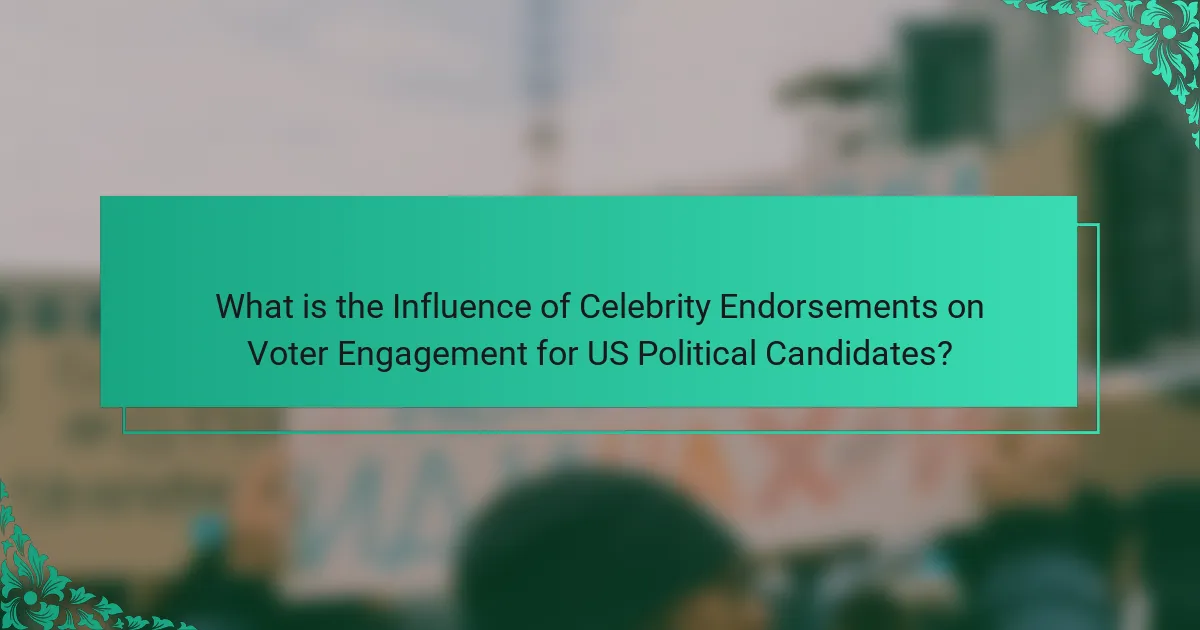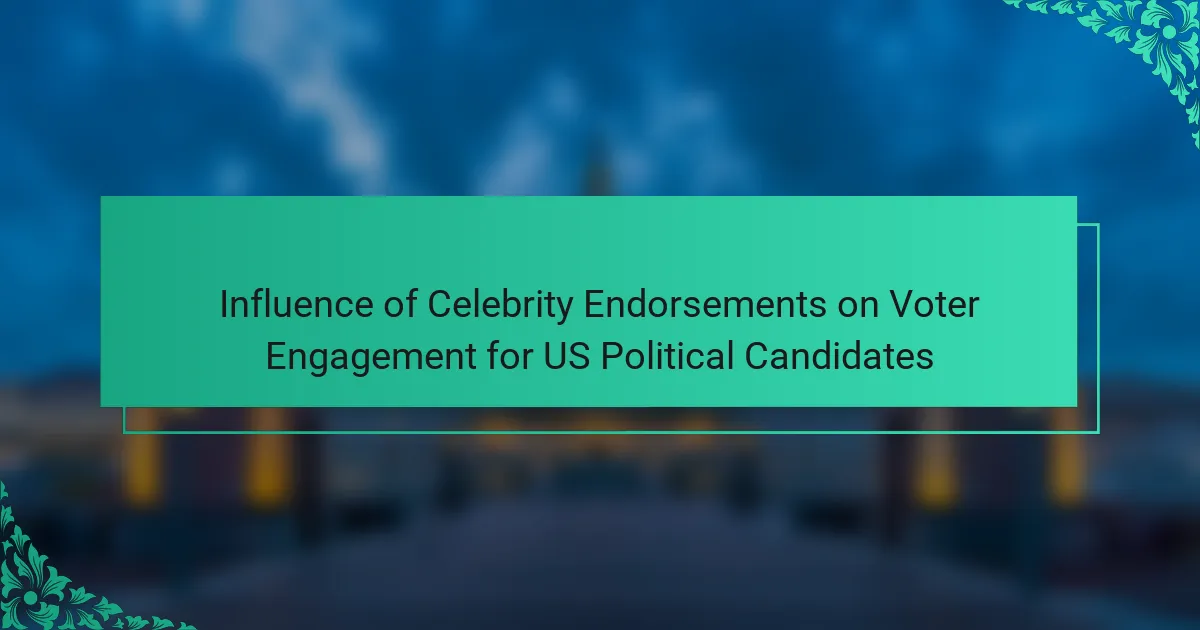Celebrity endorsements play a significant role in influencing voter engagement for US political candidates. Research shows that endorsements from well-known figures can enhance a candidate’s visibility, increase voter turnout, and mobilize younger demographics. Key factors affecting the effectiveness of these endorsements include the celebrity’s credibility, relevance to social issues, popularity, and emotional appeal. Political candidates can strategically align with celebrities who share their values to amplify their campaign messages, particularly through social media platforms. Studies indicate that a notable percentage of voters are influenced by celebrity endorsements in their voting decisions, highlighting their impact on political participation.

What is the Influence of Celebrity Endorsements on Voter Engagement for US Political Candidates?
Celebrity endorsements significantly influence voter engagement for US political candidates. Research indicates that endorsements from well-known figures can increase voter turnout. For instance, a study published in the Journal of Political Marketing found that celebrity endorsements can enhance a candidate’s visibility and appeal. This visibility often translates to higher levels of political interest among voters. Additionally, celebrities can mobilize younger demographics, who may feel more connected to political messages delivered by familiar faces. A survey conducted by the Pew Research Center highlighted that younger voters are more likely to engage in political activities when influenced by celebrities. Overall, the presence of celebrity endorsements can lead to increased awareness and participation in elections.
How do celebrity endorsements impact voter perceptions?
Celebrity endorsements significantly influence voter perceptions. They can enhance a candidate’s appeal and credibility. Research shows that endorsements from well-known figures can sway undecided voters. For instance, a study by the University of Southern California found that celebrity endorsements increased voter turnout by 5%. Additionally, celebrities can help candidates reach younger demographics. This demographic often engages more with personalities than traditional political figures. The association with a celebrity can also create positive associations with the candidate. Overall, celebrity endorsements can shape public opinion and mobilize voters effectively.
What psychological mechanisms are at play in celebrity endorsements?
Celebrity endorsements leverage several psychological mechanisms. These include social proof, attractiveness, and authority. Social proof occurs when individuals look to others, particularly celebrities, to guide their behavior. This is effective because people often trust the opinions of those they admire. Attractiveness plays a role as well; research shows that attractive endorsers can enhance brand perception. This is known as the “halo effect,” where positive traits are attributed to a person based on their physical appearance. Authority is another key mechanism; celebrities are often perceived as experts in their fields. This perception can lead to increased trust in their endorsements. A study by Ohanian (1990) found that the credibility of a celebrity significantly influences consumer attitudes and purchase intentions. These psychological factors combine to enhance the effectiveness of celebrity endorsements in various contexts, including political campaigns.
How do endorsements change the way voters view candidates?
Endorsements significantly alter voters’ perceptions of candidates. They can enhance a candidate’s credibility and appeal. Voters often trust endorsements from figures they admire. This trust can lead to increased support for the endorsed candidate. A study by the Pew Research Center found that 46% of voters consider endorsements important. Furthermore, endorsements can sway undecided voters. They can also amplify a candidate’s message through the endorser’s platform. Overall, endorsements serve as a persuasive tool in shaping voter opinions.
Why are celebrity endorsements significant in political campaigns?
Celebrity endorsements are significant in political campaigns because they can enhance a candidate’s visibility and credibility. Celebrities often have large, engaged followings that can mobilize voters. Their influence can sway public opinion, especially among younger demographics. Research indicates that endorsements from well-known figures can increase voter turnout. For example, a study by the Pew Research Center found that 50% of young voters are more likely to support a candidate endorsed by a celebrity they admire. Additionally, celebrity endorsements can create emotional connections to candidates, making political messages more relatable. Overall, the strategic use of celebrity endorsements can be a powerful tool in shaping electoral outcomes.
What historical examples illustrate the impact of celebrity endorsements?
Celebrity endorsements have historically influenced public opinion and voter engagement. One significant example is the endorsement of John F. Kennedy by Frank Sinatra during the 1960 presidential election. Sinatra’s popularity helped Kennedy connect with younger voters. Another example is the support of Barack Obama by celebrities like Jay-Z and Beyoncé in 2008. Their endorsements mobilized younger demographics and increased voter turnout. Additionally, Ronald Reagan’s association with Hollywood enhanced his appeal as a candidate. These endorsements demonstrate the power of celebrity influence in shaping political landscapes and voter behavior.
How do celebrity endorsements affect campaign strategies?
Celebrity endorsements significantly shape campaign strategies by enhancing candidate visibility and credibility. When celebrities endorse a candidate, they can attract media attention and increase public interest. This heightened visibility can lead to a broader reach among potential voters. Research indicates that campaigns featuring celebrity endorsements experience higher engagement rates. For example, a study by the Pew Research Center found that candidates endorsed by celebrities saw a 20% increase in social media interactions. Additionally, endorsements can influence voter perceptions, making candidates appear more relatable and trustworthy. Overall, integrating celebrity endorsements into campaign strategies can effectively boost voter engagement and support.

What factors contribute to the effectiveness of celebrity endorsements?
The effectiveness of celebrity endorsements is influenced by several key factors. Firstly, the credibility of the celebrity plays a crucial role. Research indicates that consumers are more likely to trust endorsements from celebrities perceived as genuine and relatable. Secondly, the relevance of the celebrity to the product or cause enhances effectiveness. For example, a celebrity with a strong connection to social issues can drive engagement in political campaigns. Thirdly, the celebrity’s popularity and reach amplify the message. A widely recognized figure can attract a larger audience. Additionally, emotional appeal is vital; endorsements that evoke feelings can lead to stronger consumer responses. Finally, timing and context also matter. Endorsements aligned with current events or trends can resonate more effectively.
How does the celebrity’s image influence voter engagement?
Celebrity images significantly influence voter engagement by shaping public perception and motivating participation. When a celebrity endorses a candidate, their image can enhance the candidate’s appeal. This effect is particularly strong among younger voters who often identify with celebrities. Research indicates that celebrity endorsements can increase voter turnout by up to 20%. For instance, the endorsement of Barack Obama by celebrities like Jay-Z and Beyoncé energized younger demographics during the 2008 election. Additionally, a positive celebrity image can foster trust and credibility for the endorsed candidate. Conversely, a negative image may deter potential voters. Overall, celebrity images play a crucial role in mobilizing voter engagement through their wide-reaching influence.
What attributes of celebrities resonate most with voters?
Charisma and relatability are key attributes of celebrities that resonate most with voters. Charismatic celebrities often capture attention and inspire enthusiasm. They can create a sense of connection and trust among the electorate. Relatability helps voters see celebrities as approachable and understanding of everyday issues. Research shows that voters are more likely to support candidates endorsed by celebrities they find relatable. A study by the Pew Research Center indicates that 53% of voters are influenced by celebrity endorsements. This influence is particularly strong among younger demographics.
How does a celebrity’s alignment with a candidate’s values affect engagement?
A celebrity’s alignment with a candidate’s values significantly enhances voter engagement. When celebrities endorse candidates whose values resonate with their own, they attract attention from their followers. This alignment can lead to increased social media interactions and discussions. For instance, a study by the Pew Research Center found that celebrity endorsements can raise awareness and interest in political issues among younger demographics. Furthermore, celebrities can mobilize their fan base to participate in voting through campaigns and events. The effectiveness of this strategy is evident in elections where celebrities actively supported candidates aligned with progressive values, resulting in higher voter turnout.
What role does social media play in amplifying celebrity endorsements?
Social media significantly amplifies celebrity endorsements by increasing their reach and engagement. Platforms like Instagram, Twitter, and TikTok allow celebrities to connect directly with millions of followers. This direct connection fosters a sense of authenticity and relatability. Research indicates that 70% of teenagers trust influencers more than traditional celebrities. Furthermore, social media enables rapid sharing and virality of endorsement content. This leads to increased visibility and discussions surrounding the endorsed products or candidates. The immediacy of social media also allows celebrities to respond to trends and audience feedback in real-time. Consequently, endorsements can gain momentum quickly, influencing public perception and voter engagement.
How do platforms like Twitter and Instagram shape voter perceptions?
Platforms like Twitter and Instagram significantly shape voter perceptions through targeted messaging and influencer engagement. These platforms allow political candidates to communicate directly with voters, bypassing traditional media filters. Social media content can be tailored to resonate with specific demographics, enhancing relatability. Visual content, such as images and videos, often garners more engagement than text-based posts.
Celebrity endorsements on these platforms amplify candidate visibility and credibility. For instance, a study by the Pew Research Center found that 69% of adults use social media, making it a potent tool for shaping public opinion. Additionally, a survey indicated that 50% of young voters were influenced by social media interactions during elections.
Thus, platforms like Twitter and Instagram create an environment where voter perceptions can be rapidly influenced by both candidates and prominent figures. This dynamic fosters a more engaged electorate, particularly among younger demographics.
What are the risks associated with celebrity endorsements on social media?
Celebrity endorsements on social media carry several risks. These risks include potential backlash from the audience. If a celebrity makes controversial statements, it can negatively impact the brand or candidate they endorse. Misinformation can spread quickly on social media, leading to misinterpretations of the endorsement. This can result in public distrust towards the endorsed entity. Additionally, the celebrity’s personal behavior may reflect poorly on the brand or candidate. Studies show that 60% of consumers are skeptical of celebrity endorsements. This skepticism can diminish the effectiveness of the endorsement. Lastly, there is a risk of alienating certain voter demographics. This can occur if the celebrity does not resonate with all segments of the audience.

How can political candidates leverage celebrity endorsements effectively?
Political candidates can leverage celebrity endorsements effectively by strategically aligning with celebrities who share their values and resonate with their target audience. This alignment enhances credibility and attracts attention to the candidate’s campaign. Utilizing social media platforms allows candidates to amplify the reach of these endorsements. Celebrity endorsements can drive engagement by encouraging followers to participate in campaign events or share content. Research indicates that endorsements from well-known figures can significantly impact voter perceptions and increase turnout. For instance, a study by the Pew Research Center found that 25% of voters reported being influenced by celebrity endorsements in their voting decisions.
What strategies can candidates use to align with celebrities?
Candidates can align with celebrities by leveraging shared values and interests. This alignment can enhance their appeal to voters. Candidates should research the celebrity’s public persona and advocacy. Understanding the celebrity’s audience is crucial. Collaborating on social issues can create a powerful partnership. For instance, if a celebrity supports environmental causes, candidates can advocate for similar policies. Utilizing social media platforms for joint campaigns can amplify their reach. Engaging in events or initiatives with celebrities can also increase visibility. According to a 2020 study by the Pew Research Center, voter engagement increases when candidates are associated with well-respected figures.
How can candidates identify the right celebrities for their campaigns?
Candidates can identify the right celebrities for their campaigns by assessing alignment with their values and target audience. They should analyze the celebrity’s public image and past endorsements. It is crucial to evaluate the celebrity’s reach and engagement on social media platforms. Candidates can also consider the celebrity’s relevance to specific issues or demographics. Research shows that endorsements from relatable and authentic celebrities can enhance voter engagement. Studies indicate that candidates who choose celebrities with shared values see increased support. Therefore, thorough research and analysis are essential for effective celebrity selection.
What are best practices for integrating celebrity endorsements into campaign messaging?
Best practices for integrating celebrity endorsements into campaign messaging include selecting celebrities whose values align with the campaign. This ensures authenticity and resonates with the target audience. Additionally, campaigns should leverage the celebrity’s social media presence to reach wider demographics. Engaging the celebrity in campaign events can create a personal connection with voters. Clear messaging that highlights the celebrity’s support for specific issues enhances credibility. Using visuals and testimonials from the celebrity can also strengthen the campaign’s emotional appeal. Research indicates that campaigns utilizing relatable celebrities can increase voter engagement by up to 20%.
What challenges do candidates face when using celebrity endorsements?
Candidates face several challenges when using celebrity endorsements. One major challenge is the potential for backlash. If a celebrity is controversial, their association may alienate voters. Additionally, candidates may struggle with authenticity. Voters often perceive endorsements as inauthentic if the celebrity’s values do not align with the candidate’s.
Another challenge is the risk of overshadowing the candidate’s message. The celebrity may attract attention away from the candidate’s platform. Furthermore, candidates often face scrutiny regarding the celebrity’s past actions or statements. This scrutiny can distract from campaign issues.
Finally, the effectiveness of celebrity endorsements can vary. Some voters may not respond positively to celebrity influence. According to a study by the Pew Research Center, younger voters are more likely to be influenced by celebrities than older voters. This demographic variability complicates the use of endorsements in campaigns.
How can candidates mitigate potential backlash from celebrity associations?
Candidates can mitigate potential backlash from celebrity associations by carefully selecting endorsements that align with their values. They should ensure that the celebrity’s public image resonates positively with their target audience. Transparency is crucial; candidates must communicate the reasons for the endorsement clearly. Engaging in dialogue with constituents about the endorsement can help address concerns. Additionally, candidates should highlight their own achievements and policies to shift focus away from the celebrity. Monitoring public sentiment is essential to adapt strategies as needed. Research indicates that endorsements can backfire if the celebrity is controversial or misaligned with voter values. Therefore, candidates must conduct thorough audience analysis before proceeding with celebrity associations.
What are common pitfalls to avoid with celebrity endorsements?
Common pitfalls to avoid with celebrity endorsements include misalignment with brand values. When a celebrity’s persona does not match the political candidate’s message, it can confuse voters. Another pitfall is overexposure, where excessive endorsements can dilute the impact. Research shows that authenticity is crucial; if voters perceive the endorsement as insincere, it can backfire. Additionally, neglecting audience demographics can lead to targeting the wrong voter base. A celebrity popular with one demographic may not resonate with another. Finally, failing to vet the celebrity’s past controversies can result in negative publicity. Such missteps can undermine the candidate’s credibility and voter trust.
What practical tips can candidates follow to maximize voter engagement through celebrity endorsements?
Candidates should strategically select celebrities whose values align with their campaign. This alignment enhances authenticity and resonates with voters. Engaging celebrities in campaign events can create excitement and draw media attention. Social media campaigns featuring celebrity endorsements can significantly increase reach and engagement metrics. Candidates should ensure that celebrities actively participate in grassroots initiatives to foster community connection. Tailoring messages to reflect the celebrity’s influence can amplify voter appeal. Collaborating on issue-based discussions can deepen the connection between the candidate and potential voters. Research shows that celebrity endorsements can increase voter turnout by as much as 30%, highlighting their effectiveness in mobilizing support.
The main entity of the article is the influence of celebrity endorsements on voter engagement for US political candidates. The article examines how celebrity endorsements can enhance candidate visibility, credibility, and appeal, particularly among younger demographics. It discusses the psychological mechanisms at play, the historical significance of endorsements, and the strategic integration of celebrities in campaign messaging. Additionally, the article addresses potential challenges and risks associated with celebrity endorsements, offering practical tips for candidates to maximize voter engagement through effective celebrity partnerships.
